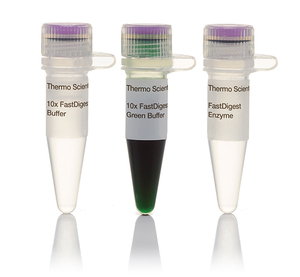Specifications:
| Application | Cloning, Transfection | ||
| Storage Temperature | -20°C | ||
| Product Type | Enzymes | Forms | Liquid |
| Product Brand | Thermo Fisher Scientific™ | ||
| Product Grade | Molecular Biology | ||
Thermo Scientific™ BamHI is a high-quality restriction enzyme that specifically recognizes and cleaves the palindromic DNA sequence 5'- G↓GATCC -3' / 3'- CCTAG↑G -5'. This enzyme is widely used in molecular cloning, restriction site mapping, genotyping, and Southern blot analysis.
BamHI efficiently cleaves double-stranded DNA at 37°C and is optimized for use with its own unique buffer to ensure precise and reproducible DNA digestion. It is fully compatible with the Thermo Scientific Five Buffer System and the universal Tango buffer for double digestions.
Key Features & Benefits
- High-Specificity Restriction Digestion
- Recognizes and cleaves G^GATCC restriction sites with high precision.
- Produces sticky ends for efficient cloning and ligation.
- Optimized for Molecular Cloning & Genetic Engineering
- Works best at 37°C in BamHI-specific buffer.
- Part of Thermo Scientific’s Five Buffer System, enabling universal compatibility.
- Efficient DNA Cleavage for Reliable Performance
- High enzyme activity (10 U/μL) for rapid DNA processing.
- Also available in FastDigest format for accelerated workflows.
- Compatible with Downstream Applications
- Works seamlessly with DNA ligases, polymerases, and modifying enzymes.
- Produces fragments ideal for recombinant DNA techniques.
- Stable & High-Quality Manufacturing
- Stringently tested to ensure high purity and consistency.
- Free from nonspecific nuclease contamination.
Product Specifications
| Feature | Details |
|---|---|
| Product Name | Thermo Scientific™ BamHI Restriction Enzyme |
| Recognition Sequence | 5'- G↓GATCC -3' / 3'- CCTAG↑G -5' |
| Catalog Numbers | ER0051 (4,000 units), ER0052 (5 × 4,000 units), ER0055 (10,000 units) |
| Enzyme Concentration | 10 U/μL |
| Optimal Temperature | 37°C |
| Compatible Buffer | Unique 10X BamHI Buffer, Tango Buffer for Double Digestions |
| Methylation Sensitivity | Not Sensitive to Dam, Dcm, or CpG Methylation |
| Heat Inactivation | Yes (65°C for 20 minutes) |
| Type IIS Restriction Enzyme | No |
| Shipping Conditions | Ice Packs (International), Dry Ice (Bulk Orders) |
| Storage Conditions | -20°C |
| Unit Size | Each |
Use Cases & Applications
1. Molecular Cloning & Recombinant DNA Technology
- Plasmid & Vector Digestion for Gene Cloning
- Produces sticky ends for directional ligation and cloning.
- Ensures efficient DNA fragment excision for subcloning applications.
- Double Digestion for Seamless DNA Assembly
- Works efficiently with other restriction enzymes for multi-fragment cloning.
- Reduces reaction time and enhances accuracy in restriction-based cloning.
2. Genotyping & Genetic Variation Analysis
- Restriction Fragment Length Polymorphism (RFLP) Analysis
- Identifies genetic variants based on restriction enzyme digestion patterns.
- Used for genotyping, marker-assisted selection, and forensic analysis.
- Single Nucleotide Polymorphism (SNP) Detection
- Helps detect point mutations and insertions/deletions in genomic DNA.
- Supports molecular diagnostics and genetic screening applications.
3. Southern Blotting & DNA Fragment Analysis
- Preparation of DNA Fragments for Hybridization Assays
- Ensures specific and reproducible restriction digestion for probe hybridization.
- Used in gene mapping and epigenetic studies.
- Chromosomal Analysis & Methylation Studies
- Suitable for methylation-dependent restriction analysis.
- Helps in differentiating genetic variations and structural modifications.
4. High-Throughput Cloning & Next-Generation Sequencing (NGS)
- Efficient Restriction Digestion for Library Preparation
- Generates consistent DNA fragments for sequencing library construction.
- Ensures uniform fragment size for quality sequencing reads.
- Compatible with Automated Workflows & Liquid Handling Systems
- Ideal for robotic sample processing in high-throughput genomic workflows.
- Eliminates time-consuming buffer exchanges, streamlining DNA digestion workflows.
Recommended Protocol for BamHI Digestion
Standard 50 µL Reaction Setup:
| Component | Volume |
|---|---|
| Plasmid or Genomic DNA | 0.5–1 µg |
| BamHI Restriction Enzyme (10 U/μL) | 1 μL |
| 10X BamHI Buffer | 5 μL |
| Nuclease-Free Water | Adjust to 50 μL |
Incubation & Post-Digestion Processing
- Digest at 37°C for 1 hour for complete restriction.
- Heat inactivate at 65°C for 20 minutes, if necessary.
- Analyze digestion products on a 1–2% agarose gel using ethidium bromide or SYBR Safe staining.
Storage & Handling Instructions
- Storage Conditions:
- Store at -20°C for long-term enzyme stability.
- Avoid freeze-thaw cycles to maintain enzyme activity.
- Handling Precautions:
- Use sterile, nuclease-free reagents and pipette tips to prevent contamination.
- Work in a DNA-free environment to ensure reproducibility.
- Disposal Guidelines:
- Dispose of enzyme and buffers according to biosafety waste regulations.
- Use approved chemical waste disposal protocols for reaction waste.
Why Choose Thermo Scientific™ BamHI?
✅ High specificity for G^GATCC restriction sites with no star activity
✅ Optimized for molecular cloning, restriction mapping, and genetic engineering
✅ Compatible with the universal Tango buffer for double digestions
✅ Reliable and consistent performance in traditional and high-throughput workflows
✅ Methylation-insensitive enzyme for robust DNA digestion
Thermo Scientific™ BamHI is a highly precise, fast-acting restriction enzyme, making it a trusted choice for molecular biology, cloning, and DNA analysis applications.
- Pack Size: 4,000 Units 10,000 Units 5 x 4,000 units




 0
0
